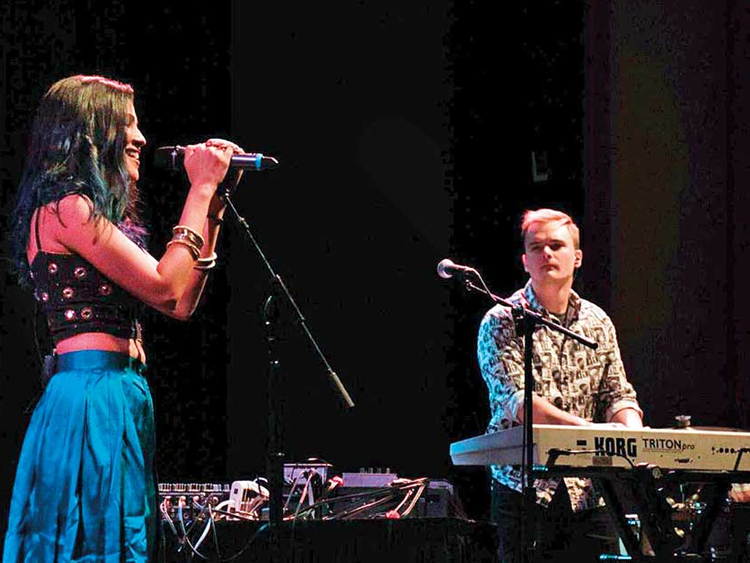
Vidya Vox, a mash-up singer of Western electronic dance music and Indian ragas, loaded her crew into cars and ventured into the desert with sun visors from a 99-cent store. The YouTube star was shooting a new video and had packed an array of talents and nationalities to spend two days kicking up dust in Joshua Tree and Palmdale.
“I love mixing Indian and Western,” said Vox, who for the video teamed up with Arjun, a Sri Lankan-born British singer with a large YouTube audience. “I thought if Coachella happened in Rajasthan [India] or Burning Man happened in Rajasthan how would we all look?”
Vox is at once an ancient heart and a modern confection, slipping between love, abandon and defiance in videos that move in swift rhythms and lyrics that weave English, Malayalam and Tamil. With hybrids that mix the likes of Taylor Swift with Indian composer A.R. Rahman, and a new EP of original music, Vox has tapped into an international vein with nearly 300 million YouTube views and over 3.5 million subscribers on her Vidya Vox channel.
CYBER FAME
A Twitter-age, multi-cultural diva, Vox is an instinctive marketer and a tell-tale face in a globalised music landscape of streaming and crossovers. She has found cyber fame by drawing on the Carnatic traditional music she learned as a child in Chennai, India, and the hip-hop and electronic grooves she listened to on a school bus when her family moved to the suburbs of Washington DC.
At 27, Vox, whose real name is Vidya Iyer, is surprised by how quickly she found success: “It just grew,” she said. “I didn’t even have time to think between one million and two million subscribers.”
Sitting with her co-writer-producer-boyfriend, Shankar Tucker, who also directs her videos, Vox is a woman at a turning point. YouTube delivered her to the world but musicians who become stars on the channel don’t often make it in the old-school world of record deals, radio play and a chance for wider success.
“There’s no longevity on YouTube. You have to keep pushing boundaries,” said Vox, whose first YouTube hit in 2011 was a rendition of the Indian classical song Nee Nenaindal.
“It’s all about the balance. For musicians, me personally, you just can’t keep doing covers or mash-ups. It would get old pretty fast.”
Her new EP release, Kuthu Fire, which includes six songs co-written with Tucker, is a gambit to resonate beyond the boundaries of YouTube and into a music world greatly changed by iTunes and Spotify. The songs and videos are meant to attract potential producers, managers, concert promoters and record labels with original dance pop that fuses Indian and Western beats.
“There’s a shelf life for anybody on YouTube and the question is what do you do when you’re at the top,” said Tucker. “Can you point yourself somewhere else?”
CULTURAL COMPONENT
Tucker, a more subdued clarinetist raised in Massachusetts, pens his own compositions that are soothing explorations that seem to echo from centuries past. Neither wants to sacrifice the Indian component of their sound, a prospect that could arise in future record negotiations.
“People are open to other cultures and other types of music they’re not familiar with and now everyone has jumped on board with that production style,” said Vox. “I remember those moments listening to Where Are U Now with Justin Bieber on the radio and DJ Snake on Let Me Love You and Lean On by Major Lazer. I feel that when those three broke to the ‘mainstream’. And now if you listen to Katy Perry’s new album and all these other albums they all have those influences.”
Vox met Tucker while at George Washington University. She graduated in 2012 and was planning to go to medical school. But she was drawn to music and returned to India, where Tucker, a Fulbright scholar, was studying classical styles and had started his ShrutiBox channel on YouTube. Vox and her sister, Vandana, sang classical Indian compositions that Tucker produced. “I thought, oh, this is cool,” said Vox, “you can put your music out on YouTube and get messages from all over the world.”
The mash-ups followed and Vox’s fan base grew, notably in India, which she estimates accounted for 70 per cent of her viewers. Today, about 50 per cent of her followers are Indian, with the rest coming from the US, UK, Canada and other countries.
ONLINE BACKLASH
However, Vox has discovered that being a YouTube celebrity has frustrations. She recently pulled eight videos from the channel after Indian publishing houses raised copyright issues and demanded what she described as exorbitant fees for using songs. Critics of YouTube in the music industry complain that mash-ups and covers of songs on the channel often do not protect copyrights or reward songwriters.
The channel can also unleash angry comments and emails when viewers don’t like a rendition of a favourite song. Vox admires Rahman, who composed music for the Academy Award-winning film Slumdog Millionaire. But her remix of his classic Taal Se Taal Mila from Taal drew ire.
“People said, ‘how dare you do this.’” said Vox. “And I was like this is a Bollywood song, please relax. It’s not a devotional or religious song. It’s a movie song talking about love. I didn’t violate anything sacred here.
“I coudn’t get out of bed for a day and a half. I was so depressed.”
Vox says she’s had offers to become an actress and enter the enormous bubble of Bollywood. “People say, ‘Oh, you gotta go to Bollywood and sing these movie songs.’ That for them is the epitome of achievement. You get a song with any of the composers there and you’ve made it.” But she worries about losing creative control and sacrificing an independent music career. “Maybe it’s a mistake,” she says, “but I’m not accepting acting offers.”














